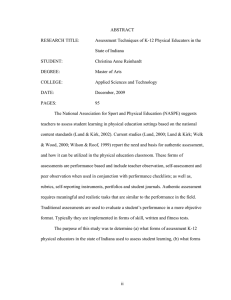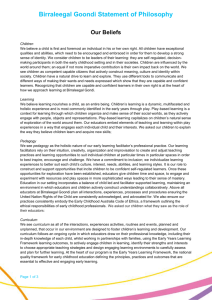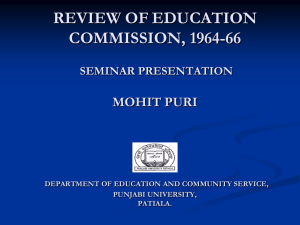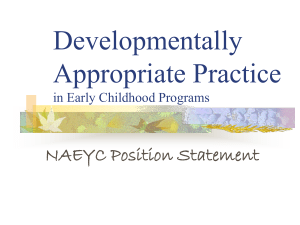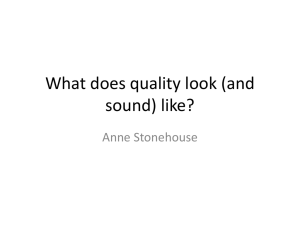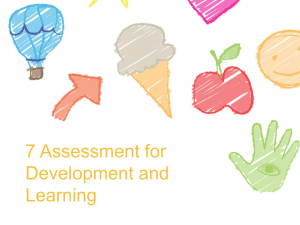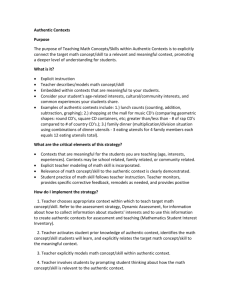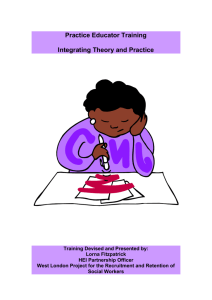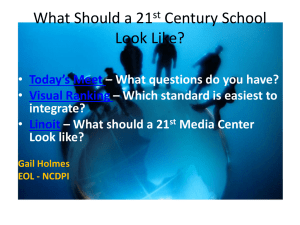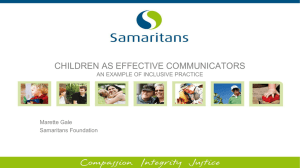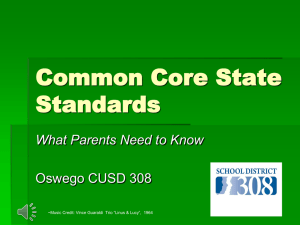Chapter 2
advertisement
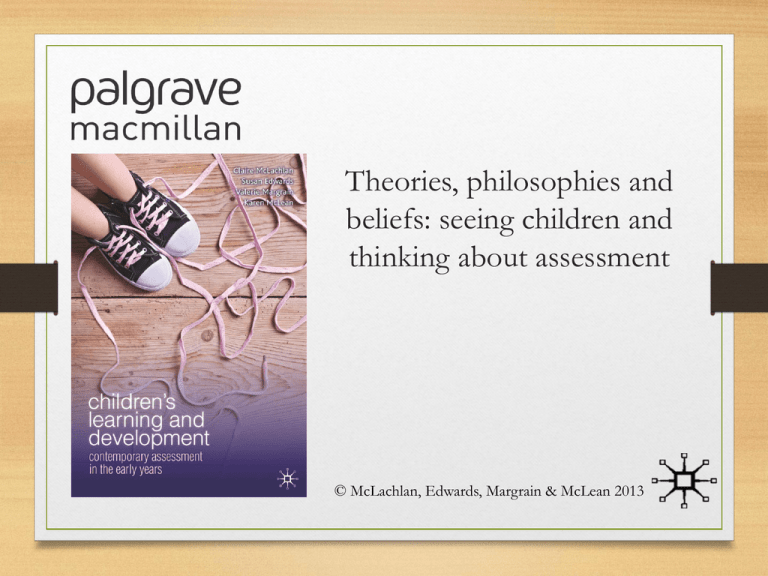
Theories, philosophies and beliefs: seeing children and thinking about assessment © McLachlan, Edwards, Margrain & McLean 2013 Theories, philosophies and ‘seeing’ children • What educators believe and value about teaching and learning is likely to influence how and why they will use assessment in early childhood education • Beliefs and values influence how educators ‘see’ young children • How educators ‘see’ young children is influenced by the range of theories and philosophies they encounter about children, learning and development Theory/philosophy View of children/childhood Suggested methods Pestalozzi (1800s) Children are innately good and childhood unfolds naturally over time Children collect materials from nature that they observe, explore and discuss Froebel (1800s) Naturally creative and productive Provision of a ‘kinder’ (child) ‘garten’ (garden) for children to play and participate in hands-on activities Progressive – Dewey (1900s) Children are part of a social and democratic community Children participate in social activities and take responsibility for daily tasks and activities in the classroom Developmental (1960s) Children construct logical understandings of their world that are based on particular ages and stages of development Children are part of social and cultural communities and contexts that define their developmental expectations and experiences Educational experiences and activities are offered to children so that they can actively explore and construct their own knowledge Children are located in multiple contexts and experiences. There is no ‘one’ way to view and understand childhood and development. Education is orientated towards helping children understand and respect multiple worldviews and ways of being Sociocultural (1990s onwards) Postdevelopmental (2000s onwards) Children and adults co-construct learning together by developing and exploring learning interests and a range of culturally relevant experiences (Adapted from Lim and Genishi 2010, pp. 514-517) The ‘image of the child’ The ‘image’ the educator holds of the child and the child’s consequent learning is where teaching begins: There are hundreds of different images of the child. Each one of you has inside yourself an image of the child that directs you as you begin to relate to a child. This theory within you pushes you to behave in certain ways; it orientates you as you talk to the child, listen to the child, observe the child. It is very difficult for you to act contrary to this internal image. For example, if your image is that boys and girls are very different from one another, you will behave differently in your interactions with each of them. (Malaguzzi, 1994) Views about learning influence what educators think about assessment What might this educator think about assessment: I see children as very inquisitive. They are active and busy and have lots of questions. They are interested in sharing what they know with each other and with adults. I think this inquisitiveness and interest in sharing means they learn by making connections. I am interested in the connections children make with each other and with ideas. I like to see where their ideas come from. We talk about what they have done at home or with their families and friends and then I understand why they are interested in different things. Learning is about talking and sharing and thinking. Seeing with constructivism • Constructivist theory suggests • children learn by engaging with their environments in ways that prompt investigation and exploration • children engage and investigate in qualitatively different ways according to their particular stage of development • This meant assessment focused on what children could do • often looking at different domains of development and if children were able to achieve particular skills according to a stage of development • Assessment approaches include checklist, running records and anecdotal records Seeing with sociocultural theory • Mediation involves people connecting with each other through language • Language is a cultural tool children acquire via interactions with other people • Assessment focuses on how children are learning with others • Observations detail the nature of interactions occurring between children, educators and peers Authentic assessment • Authenticity is focused on finding out what is ‘real’ or genuine about an object or a situation • Authentic assessment provides an understanding of the knowledge of the child – not just what a child can demonstrate for a test Our experience has been that when teachers are given a developmental test or checklist, there is a tendency for them to pull children from preferred activities and assess them in an item-by-item fashion. This format is problematic because it is contrary to recommended assessment practices and particularly not useful with a curriculum embedded instrument that is primarily developed for purposes of guiding curriculum development. (Grisham-Brown, Hallam & Brookshire 2006, p. 48) Using authentic assessment • Use familiar materials that are strongly connected to children’s experiences in their social settings • Uses multiple sources of evidence collected over a period of time to illustrate learning (Darling-Hammond & Snyder 1999), such as: • Documents • Observations • Photographs • Recordings • Include and value children’s perspectives Four principles of authentic assessment 1) Focused on finding out what children know and can do 2) Uses familiar materials 3) Connected to children’s learning contexts 4) Draws on multiple sources of evidence (Bagnato 2007) Conclusion In effective assessment, the educators’ tasks of observing children’s learning, trying to understand it, and their responsibility to put their understanding to good use, are all at the service of young children. (Drummond 2010, p. 321) Key terms • Sociocultural theory – a theoretical perspective informed by the work of Vygotsky. It argues that children’s learning is mediated through their relationships with other people and enabled by language as a cultural tool. • Post-developmental – a term applied to a range of theories that challenge the idea that young children’s learning occurs across different domains and is related to particular ages and stages of development. • Authentic assessment – the use of assessment strategies and approaches to seek to determine the real understanding and ideas children have about their own learning.
